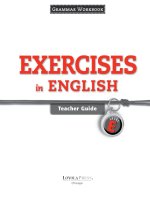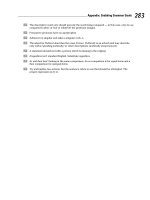English Grammar Workbook for Dummies
Bạn đang xem bản rút gọn của tài liệu. Xem và tải ngay bản đầy đủ của tài liệu tại đây (7.23 MB, 321 trang )
I
In this part . . .
n my hometown, it’s possible to find stores where signs
proclaim “merchant’s sell Bagels.” You have to give me
a minute to shudder at the small but important mistakes
(and I don’t mean mistake’s) in bagel signage. First of all,
the apostrophe (the little hook at the end of the word
merchant) is wrong, as are, in my informal count, 99.99 percent of the apostrophes I see in all sorts of official spots.
Plus, despite the fact that bagels are extremely delicious,
they don’t deserve a capital letter. Sigh. Such are the daily
trials of a grammarian in New York City.
Wherever you live, in this part, you can practice
some aspects of what grammarians call mechanics —
punctuation and capitalization. When you’re done, you’ll
be the master of the dreaded comma (Chapter 5), apostrophe (Chapter 7), and the quotation mark (Chapter 8). Plus,
you’ll know how to place hyphens and dashes and semicolons, not to mention colons (Chapter 6). Tucked into
Chapter 9 are the basics of capitalization. If all these
details fry your brain, feel free to refresh yourself with
a bagel or two.
Chapter 5
Exercising Comma Sense
In This Chapter
ᮣ Punctuating lists correctly
ᮣ Signaling a direct address
ᮣ Placing commas in dates and addresses
ᮣ Using commas to insert introductory words and interrupters
ᮣ Deciding when descriptions need to be set off by commas
T
he well-dressed writing of a hundred years ago boasted far more commas than today’s
fashionable sentences. The current trend toward what grammarians term open style
punctuation calls for commas to be used sparingly. Dwindling though they may be, these
little punctuation marks have their place — in lists, direct address, dates and addresses,
introductory expressions, interrupters, and certain types of descriptions. In this chapter
you can practice inserting and deleting commas until your writing is as proper as a maiden
aunt and as stylish as a supermodel.
Making a List and Checking It Twice
When you’re writing a free-standing list, line breaks signal when one item in a list ends and
another begins. Commas do the same thing in sentences. Perhaps Professor MacGregor
wants you to do the following:
ߜ Go on the Internet.
ߜ Locate the origin of the handheld meat patty.
ߜ Write a paper on hamburger history.
Inserted into a sentence, the line breaks in the preceding list turn into commas:
Professor MacGregor wants you to go on the Internet, locate the origin of the handheld
meat patty, and write a paper on hamburger history.
Notice that the first item isn’t preceded by a comma and that the last two items are separated by and, which has a comma in front of it. Although that last comma is optional, many
style manuals, which are stricter than the bouncer at this year’s most popular club, want
you to insert a comma before the and or whatever word joins the last two items of the list.
gniteG rydae rof sih gib ,etad boR tnew ot eht rahp ycm ot rupesahc -lairtsudn
rtshgne lianeot ,srepilc rgne eohs ,hsilop dna rae xw .revom
1.
2.









